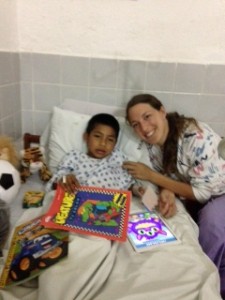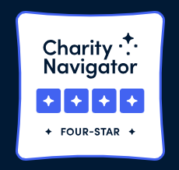I was sitting in class when my professor first mentioned her trips to Guatemala with Surgicorps International, and I instantly knew I had to go. I served two years as a Peace Corps volunteer in Guatemala from 2011-2013, where I worked in rural elementary schools, lived with a host family, and became part of a close-knit community. The experience had been life changing for me. Witnessing the lack of psychosocial care for Guatemalan children in clinics and hospitals led to my discovery of the field of child life and set me on my career path of becoming a certified child life specialist. Child life specialists support children and families facing challenging experiences related to healthcare and hospitalization, and I am a graduate student working towards certification so that I can help spread the field internationally to places like Guatemala.
Through Surgicorps International I had the amazing opportunity to return to Guatemala to do the work I had first dreamed of doing while I was a Peace Corps volunteer. When our team walked into the hospital at Obras Sociales Del Santo Hermano Pedro and I immediately began interacting with patients and speaking Spanish, I felt like I had come home. I was thrilled that I was able to use my Spanish skills to translate for surgeons and nurses during screening day and the days that followed, as well as use my training in child life to help keep children calm and happy before and after surgery.
On my third day in the hospital, one of the surgeons asked me to prepare a seven-year-old boy, Marcos, for his upcoming surgery to remove a mass from his hand. When I sat down to meet with Marcos and his father, they both appeared nervous and fidgety. In broken Spanish, Marcos’ father explained that they had traveled for two days to reach the clinic, and that they lived in the far away department of Huehuetenango and spoke a Mayan language called Chuj. Guatemala has over 21 Mayan languages, and I had learned basic Q’anjob’al during my Peace Corps service, a language that is closely related to Chuj.
In Q’anjob’al, I asked Marcos’ father his name, told him mine, and commented on the weather. His face broke into an incredulous smile. “How do you speak that?” he gasped. “Are you not American?” We began to laugh as Marcos smiled shyly, and I explained that I had lived in Santa Eulalia, Huehuetenango during the Peace Corps and learned Q’anjob’al there. The mood in the room lightened as we compared words in Q’anjob’al and Chuj, and Marcos’ father told me about their lives in an area not far from where I had once lived. Marcos came from a very poor family and was one of many brothers and sisters, and his father struggled to find work to keep the family clothed and fed. Marcos often missed school due to pain from the mass in his hand, which made it difficult for him to write. I read Marcos and his father a prep book that explained what would happen before, during, and after surgery, and engaged Marcos in medical play so he would not be afraid of medical equipment in the operating room and would understand how it was used. By the end of our meeting, Marcos and his father were relaxed, comfortable, and ready for surgery, and I felt a special bond with them both.
I accompanied Marcos to the operating room and was by his side to comfort him when he came out of anesthesia after his surgery. I then had the opportunity to spend a few hours with him in the recovery room. We played games on the iPad, colored, and talked about his life. He reminded me of my host brother in Santa Eulalia, who was also seven when I began my service. It was a joy to spend so much time with him and help him cope with a new and potentially scary experience and environment. Thanks to the generous donations of people in the United States, we were also able to supply Marcos and his family with new school supplies, clothes, and toys. I will always remember how proud and happy Marcos looked when I slipped a brand new jacket over his shoulders, or when he wrote his name on a piece of paper after surgery.
During my week volunteering with Surgicorps International, not only was I able to achieve my dream of offering child life services in Guatemala, I also reconnected with Guatemala in a way that exceeded all my expectations. It was an honor to give back to a country and people that had given so much to me during my time in the Peace Corps. I know firsthand the life-changing impact surgery will have for children like Marcos and his family, who would not be able to afford such procedures on their own. I am so grateful that Surgicorps International is doing such important healing work in the country so dear to my heart, and around the world.


